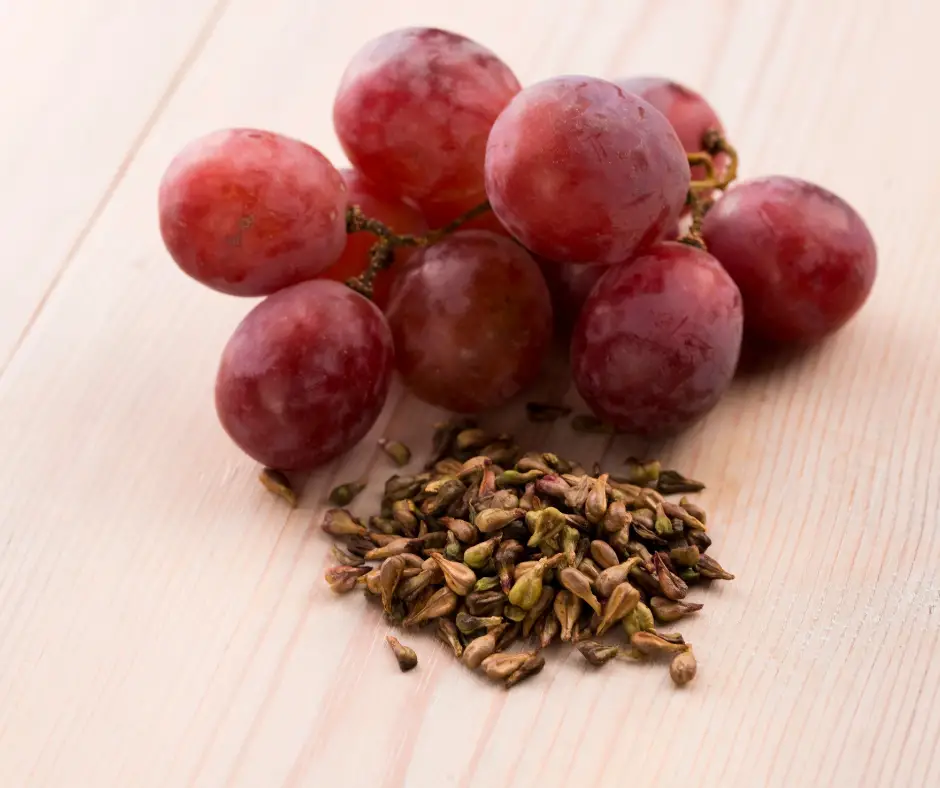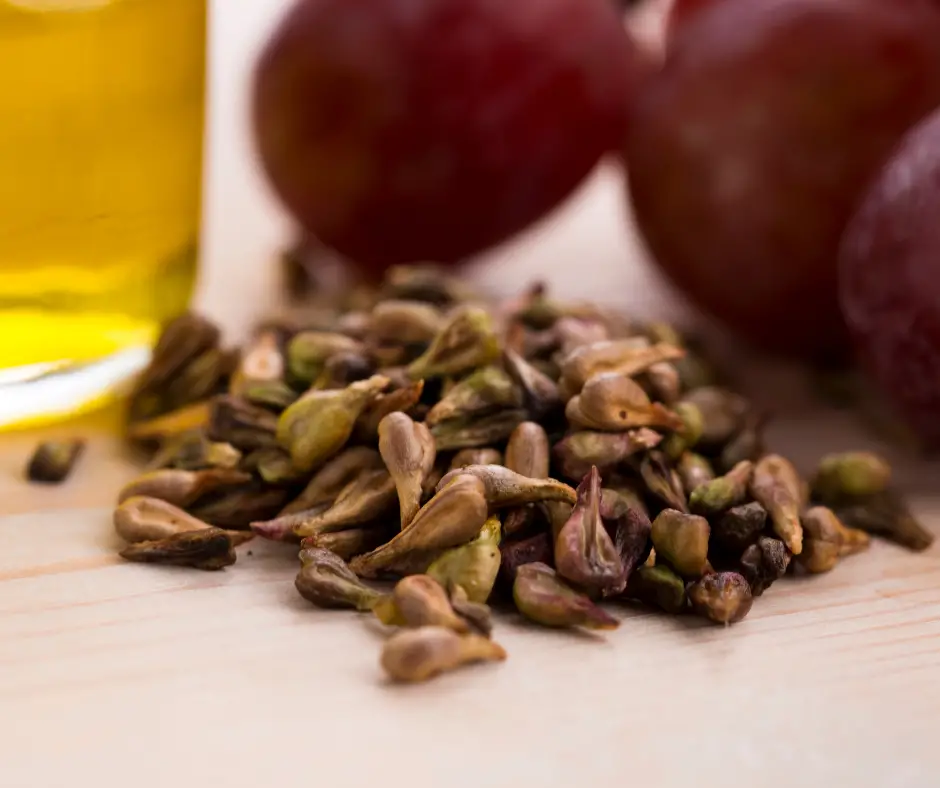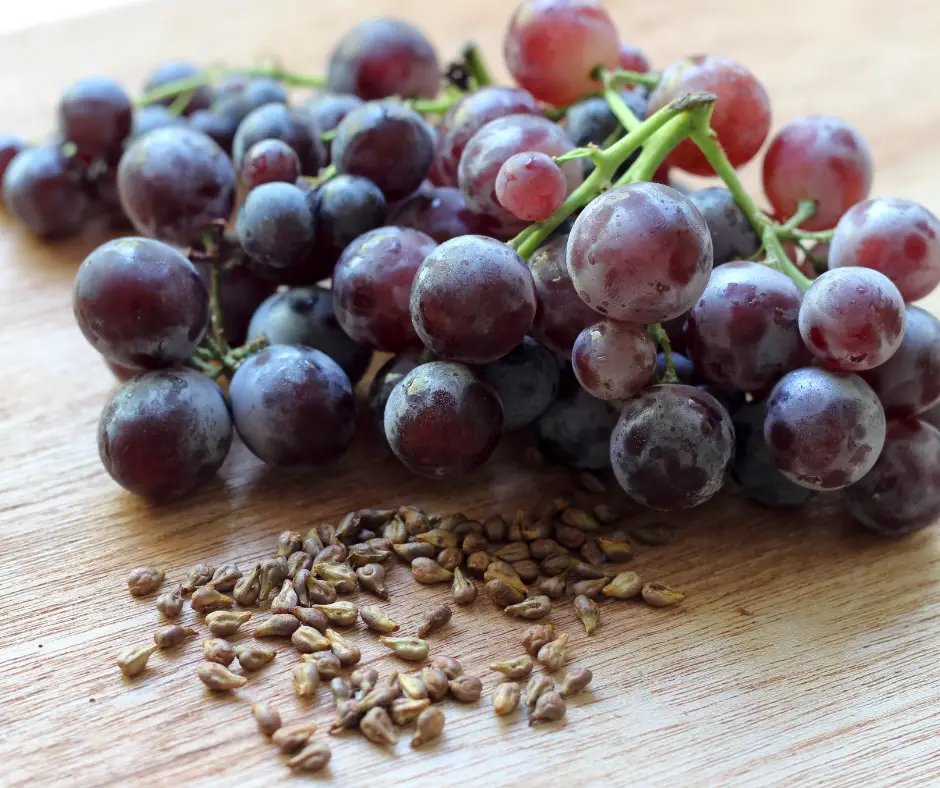In the world of fruits, grapes have always been a favorite. But what about those pesky little seeds found in the center of grapes? Are they edible? Can you eat grape seeds? This blog section will explore the topic of eating grape seeds and provide the information you need.

Why Do Grapes Have Seeds?
Grapes have seeds as part of their reproductive system. These seeds, also known as pips, are responsible for the growth of new grape plants. While many modern varieties of grapes are seedless, there are still plenty of grapes that have seeds.
Can You Eat Grape Seeds?
So, Can You Eat Grape Seeds? The short answer is yes, you can eat grape seeds. Grape seeds are safe for most people to consume. They are small, crunchy, and have a bitter taste. While some people may choose to spit them out, it is perfectly fine to chew and swallow grape seeds if you prefer.
Grape seeds contain several compounds that may offer health benefits, including:
- Antioxidants: Grape seeds are rich in antioxidants, which help protect the body from damage caused by free radicals. Antioxidants are known to reduce inflammation and support overall health.
- Flavonoids: Grape seeds contain flavonoids like resveratrol, which are linked to various health benefits, including improved heart health and brain function.
- Melatonin: Grape seeds also contain melatonin, a hormone that regulates sleep patterns. Ingesting melatonin may help improve sleep quality and induce fatigue.
While grape seeds are safe for most people, it is important to note that they may interfere with blood-thinning medications. If you are taking blood thinners or have a bleeding disorder, it is best to consult your healthcare provider before consuming grape seeds.
You can eat grape seeds raw, roasted, or ground into a powder to enjoy them. They can be added to smoothies, yogurt, oatmeal, baked goods, or eaten as a snack. It’s important to store grape seeds in a cool, dry place and chew them well to release their nutrients.
In conclusion, grape seeds are safe and can provide additional health benefits. Whether you choose to consume them or not is a personal preference. Enjoy them in moderation, and consult your healthcare provider for any concerns.
Can You Eat Grape Seeds without Chewing?
Grape seeds can be eaten without chewing but not digested in the stomach. Instead, they typically pass through the digestive system and are expelled whole. Grape seeds have a hard texture and a bitter taste, so many people choose to spit them out while eating grapes. However, if accidentally swallowed, there is no need to be concerned as they are unlikely to cause any harm. It is important to note that bitter grape seeds should not be consumed as they can have toxic effects.
Does Grape Seed Increase Testosterone?
Grape seed extract, also known as GSE, is a by-product of the winemaking process that has been marketed as a potential testosterone booster. However, the scientific evidence supporting this claim is limited and inconclusive. While some studies suggest that GSE may have some potential benefits, such as reducing testicular damage caused by toxins like alcohol and inhibiting the conversion of testosterone to estrogen, there are no direct human studies linking GSE to increased testosterone levels.
It is important to note that not all grape seed extracts are made equally. The quality of the extract can be affected by the extraction method used. Cold pressing, which involves using a hydraulic press without heat or chemicals, is considered healthier and ensures a higher-quality oil. On the other hand, industrial extraction processes involving chemicals like hexane can leave residue and potentially contaminate the extract.
In terms of its nutrient content, grape seed extract is high in omega-6 polyunsaturated fatty acids and contains a modest amount of vitamin E. However, it lacks significant amounts of other vitamins and minerals. While GSE is often marketed as a healthy alternative to other oils, limited scientific evidence supports these claims.
While grape seed extract may have some potential health benefits, such as reducing inflammation, improving blood flow, and inhibiting aromatase, there is currently not enough evidence to suggest that it directly increases testosterone levels. Other nutrients like zinc, D-aspartic acid, and vitamin D have been shown to have a more direct influence on testosterone levels and may be a better option for individuals looking to support healthy testosterone production.
What Can I Do with Seeded Grapes?
If you find yourself with a surplus of seeded grapes, there are several delicious and creative ways to make use of them. One option is to make homemade grape jelly or jam. Simmer the grape pulp and strain it through a cheesecloth to remove the seeds. The resulting grape jelly can be spread on toast or used in recipes like PB&J sandwiches.
Another idea is to make grape juice. Blend the grapes, including the seeds, in a blender or juicer and strain the mixture to remove any solids. The grape juice can be enjoyed on its own or used as a base for smoothies or cocktails. You can also freeze the juice in ice cube trays for longer-term storage.
If you’re feeling adventurous, you could try making wine with your seeded grapes. You’ll need to research and follow a step-by-step process for winemaking, which involves fermenting the grapes and aging the wine. However, be aware that homemade wine may not always turn out as desired, so it’s important to have realistic expectations.
Another option is to incorporate the grapes into a variety of recipes, such as grape pie or grape vinegar. Grape pie is a sweet, tangy dessert showcasing the grapes’ natural flavors. Grape vinegar can be used as a salad dressing or marinade, adding a unique twist to your dishes.
Lastly, consider freezing the grapes for later use. Wash and dry the grapes, seeds, and all, and store them in freezer bags. Frozen grapes make for a refreshing and healthy snack, especially during hot summer days.
Overall, there are plenty of ways to put seeded grapes to good use. From jelly and juice to wine and vinegar, you can get creative in the kitchen and enjoy the flavors of your bountiful harvest.
Can You Blend Grape Seeds?
Blending grapes with seeds is not a problem for the blender. It can still blend the grapes properly. However, if the grapes are blended too long, and the seeds blend too, it can result in bitter juice. While blending seeded grapes is not an issue for the blender itself, avoiding blending for an extended period is important to prevent the seeds from grating and making the resulting puree bitter. Seedless grapes are the ideal solution for blending, as they eliminate the need to remove seeds and ensure a smooth and enjoyable result. However, if seeded grapes are the only option available, it’s recommended to strain the blended fruit to remove any bits of the seeds’ outer layer. Overall, blending grapes with seeds is safe for the blender, but it may affect the taste of the resulting juice or puree.
Nutritional Benefits Of Grape Seeds
Grape seeds are often overlooked but contain several nutritional benefits that can contribute to overall health and well-being. Here are some of the key nutritional benefits of grape seeds:
Antioxidant Properties Of Grape Seeds
Grape seeds are rich in antioxidants, which are compounds that help protect the body against damage from harmful free radicals. The antioxidants found in grape seeds, such as vitamin E, flavonoids, linoleic acid, and oligomeric proanthocyanidins (OPCs), have been shown to have a range of health benefits, including:
- Reducing oxidative stress: Oxidative stress occurs when the body is imbalanced between free radicals and antioxidants. By consuming grape seeds, which are highly antioxidants, you can help neutralize free radicals and reduce oxidative stress.
- Protecting against chronic diseases: The antioxidants in grape seeds have been linked to a reduced risk of chronic diseases, such as heart disease, cancer, and neurodegenerative disorders. These antioxidants help combat inflammation and protect cells from damage.
- Supporting heart health: The antioxidants in grape seeds have been shown to help improve circulation, lower blood pressure, and reduce LDL (bad) cholesterol levels. This can contribute to a healthy heart and reduce the risk of cardiovascular disease.
Vitamins And Minerals Found In Grape Seeds
In addition to antioxidants, grape seeds contain various vitamins and minerals important for overall health. Some of the key vitamins and minerals found in grape seeds include:
- Vitamin E: Grape seeds are a good vitamin E source, a powerful antioxidant that helps protect cells from damage. Vitamin E also plays a role in immune function and skin health.
- Flavonoids: Grape seeds contain flavonoids, a group of plant compounds known for their antioxidant and anti-inflammatory properties. Flavonoids have been linked to a reduced risk of chronic diseases, such as heart disease and certain types of cancer.
- Linoleic acid: Grape seeds are a natural source of linoleic acid, an omega-6 fatty acid essential for brain function and overall health. Linoleic acid also helps support a healthy inflammatory response in the body.
- Oligomeric proanthocyanidins (OPCs): OPCs are a type of flavonoid found in grape seeds with antioxidant, anti-inflammatory, and anticancer properties. OPCs may also help improve blood circulation and support skin health.
Incorporating grape seeds into your diet can be a simple and nutritious way to reap the benefits of their antioxidants, vitamins, and minerals. You can add crushed grape seeds to smoothies, sprinkle them on salads, or incorporate them into baked goods for an extra nutritional boost.
You can enjoy their nutritional benefits by including grape seeds in your diet, contributing to your overall health and well-being.
Read more:
- Does Gatorade Have Caffeine? Exploring the Popular Sports Drink’s Ingredients
- Unlocking the Mystery: How Long Does Monster Energy Last?
- Is Reign Bad For You? A Closer Look at Their Effects on the Body
Potential Health Benefits Of Consuming Grape Seeds

Grape seeds, often discarded as waste, offer several potential health benefits. You may consider these benefits when answering ‘Can You Eat Grape Seeds?’. These small seeds are a rich source of antioxidants, flavonoids, and melatonin, which may positively affect various health aspects.
Cardiovascular Benefits Of Grape Seeds
Grape seeds are known for their cardiovascular benefits. The antioxidants and flavonoids in grape seeds have been shown to support heart health by reducing inflammation and protecting against oxidative stress. This can help improve overall cardiovascular function and reduce the risk of heart disease.
A study published in the National Library of Medicine found that grape seed extract substantially increased blood levels of antioxidants in healthy volunteers, indicating its potential cardiovascular benefits.
Anticancer Properties Of Grape Seeds
Research suggests that grape seeds may have anticancer properties. Grape seed extract contains various compounds, such as oligomeric proanthocyanidin complexes (OPCs), catechin, epicatechin, procyanidins, gallic acid, and gallocatechin, which have been studied for their potential to inhibit cancer growth and progression.
According to a study published in the American Society for Nutrition, grapes, and grape-based products are excellent sources of various anticancer agents. Regular consumption of grapes and grape seed extract may offer potential protection against certain types of cancer.
Anti-inflammatory Effects Of Grape Seeds
The flavonoids and antioxidants found in grape seeds also possess anti-inflammatory properties. These compounds can help reduce inflammation linked to various chronic diseases, including cardiovascular disease, diabetes, and neurodegenerative disorders.
Research has suggested that the anti-inflammatory effects of grape seed extract may delay the onset of neurodegenerative diseases like Alzheimer’s. Additionally, grape seed extract has been shown to reduce swelling and inflammation in various experimental models.
Incorporating grape seeds into your diet or taking grape seed extract as a supplement may contribute to these potential health benefits. However, it is important to note that more research is needed to fully understand the extent of these benefits and their specific mechanisms of action.
By including grape seeds in your diet, whether by consuming them directly or using grape seed extract, you may be able to support your cardiovascular health, reduce inflammation in the body, and potentially protect against certain types of cancer.
In the next section, we will explore some practical ways to include grape seeds in your diet and discuss the possible risks and considerations associated with consuming grape seeds.
Stay tuned!
How To Eat Grape Seeds?

You can try a few methods if you’re curious about incorporating grape seeds into your diet. Here are some ways to consume grape seeds and recipes to include them in your meals and snacks:
Methods Of Consuming Grape Seeds:
- Eat them raw: Grape seeds can be eaten raw, either by chewing and swallowing them or by adding them to salads, oatmeal, or smoothies.
- Roast them: Toasting grape seeds in the oven can enhance their nutty flavor and create a crunchy texture. You can sprinkle them over yogurt or granola or incorporate them into a homemade trail mix.
- Infuse them in water: Adding a few drops of grape seed extract to your water provides a subtle flavor and infuses it with antioxidants and vitamins.
- Ground them into a powder: Some health food stores sell grape seed powder, which can be used as a natural food coloring or added to smoothies, dessert recipes, or even as an ingredient in homemade skincare products.
Recipes And Ideas For Incorporating Grape Seeds Into Your Diet:
- Grape Seed Trail Mix: Create a nutritious and flavorful trail mix by combining roasted grape seeds with dried fruits, nuts, and dark chocolate chips. This makes for a convenient and satisfying snack on the go.
- Grape Seed Oil Dressing: Make a homemade salad dressing using grape seed oil as a base. Mix it with vinegar, herbs, and spices of your choice to add a unique flavor to your salads, or use it as a dipping sauce for bread or vegetables.
- Grape Seed Smoothie: Blend a handful of raw grape seeds with your favorite fruits, yogurt, and a liquid for a refreshing and nutrient-packed smoothie.
- Grape Seed Energy Balls: In a food processor, combine ground grape seeds, dates, nuts, and a sweetener like honey or maple syrup. Roll the mixture into small energy balls for a convenient snack.
Consuming grape seeds in moderation is important when incorporating them into your diet. While grape seeds offer health benefits, they can be high in calories, and their bitter taste may not appeal to everyone. Additionally, if you have any allergies or are taking medications, it’s best to consult your doctor before consuming grape seeds or grape seed extract.
By exploring different ways to incorporate grape seeds into your meals and snacks, you can enjoy their potential health benefits and add a unique twist to your culinary creations.
Precautions And Risks
While grape seeds offer potential health benefits, it is important to be aware of certain precautions and risks associated with consuming them. Here are some key points to consider:
Allergies And Sensitivities To Grape Seeds
- Some individuals may have allergies or sensitivities to grape seeds, which can lead to skin irritation and other allergic reactions. If you experience any adverse reactions after consuming grape seeds, it is important to seek medical attention.
- It is always a good idea to consult your healthcare provider if you have any known allergies or sensitivities before incorporating grape seeds into your diet.
Potential Side Effects Of Consuming Grape Seeds
- Grape seed extract, in concentrated form, may have potential side effects such as nausea or upset stomach in some individuals. However, it is generally considered safe when consumed in moderation.
- It is important to note that grape seed extract can have blood-thinning effects, which may interfere with medications for blood thinning. If you are taking any blood-thinning medications, it is crucial to consult with your healthcare provider before consuming grape seed extract.
- Pregnant and breastfeeding women should exercise caution and consult their healthcare providers before incorporating grape seed extract or grape seeds into their diet. There is no scientific evidence regarding the safety of grape seed extract or grape seed consumption during pregnancy and breastfeeding.
It is always advisable to speak with your healthcare provider before adding any new food or supplement to your diet, especially if you have any pre-existing medical conditions or are taking medications.
For more information about grape seed extract and its potential health benefits, refer to WebMD’s article on grape seed extract. Additionally, if you want to learn about the pros and cons of eating grape seeds, you can read Healthline’s article on grape seeds.
Making informed decisions about your diet and considering individual health factors before incorporating any new food or supplement into your routine is essential.
FAQ about Can You Eat Grape Seeds?
Q: Can you eat grape seeds?
A: Yes, you can eat grape seeds. However, most people do not typically consume them due to their bitter taste and hard texture.
Q: How can you eat grapes with seeds?
A: To eat grapes with seeds, think of them as hard candy. Break the skin with your teeth to release the juicy interior, but be careful not to bite into the seeds. Use your tongue to move the seeds aside and chew the skin and interior. Swallow the seeds whole with the rest of the grape, if desired.
Q: Are there health benefits to eating grape seeds?
A: Grape seeds contain nutrients, such as antioxidants, that may have potential health benefits. However, more research is needed to determine their effectiveness.
Q: Is grape seed extract a better alternative to eating grape seeds?
A: Grape seed extract is a concentrated form of grape seeds. It is commonly used in supplements and medications. It is important to consult with a doctor before taking any supplement or medication, including grape seed extract.
Q: Can eating grape seeds interact with medications?
A: Grape seed extract can have a blood-thinning effect and may interact with certain medications. It is advisable to consult with a healthcare professional before consuming grape seeds or grape seed extract, especially if you are taking blood-thinning medications.
Q: Are there any side effects or risks associated with eating grape seeds?
A: Grape seed extract is generally considered safe to consume. However, individuals allergic to grapes, those with bleeding disorders, or high blood pressure should exercise caution. It is recommended to consult with a doctor before consuming grape seeds or grape seed extract.
Q: Can children or pregnant women eat grape seeds?
A: Due to limited research on the safety of consuming grape seeds, it is recommended that children and pregnant women avoid eating grape seeds or consuming grape seed extract without guidance from a healthcare professional.
Note: This information is provided for informational purposes only and should not be considered medical advice. Consult with a healthcare professional or doctor before making any changes to your diet or starting any new supplements.
Conclusion
Now you should know the answer to ‘Can You Eat Grape Seeds?’. After analyzing the information, it is clear that grape seeds can be safely consumed and offer various health benefits. Here is a summary of the benefits and considerations of eating grape seeds:
Benefits of eating grape seeds:
- Grape seeds are rich in antioxidants, flavonoids, and melatonin, which can support heart and brain health, better sleep, and normal circulation.
- The proanthocyanidins in grape seeds have anti-inflammatory properties and may help reduce swelling.
- Grape seed extract, a concentrated form of grape seeds, has reduced inflammation, oxidative stress, and slow aging.
- Grape seeds contain compounds that may delay the onset of neurodegenerative diseases like Alzheimer’s.
- Grape seeds are a source of fiber, minerals, and vitamins like vitamin E.
Considerations when eating grape seeds:
- Grape seed extract may interfere with blood-thinning medications and should be discussed with a healthcare provider, especially if consuming large amounts.
- Pregnant or lactating individuals should avoid using grape seed supplements, as their effects are not well-studied in these populations.
- Some people may experience nausea or upset stomach from grape seed supplements, but adverse effects are minimal.
Final Thoughts On Incorporating Grape Seeds Into A Healthy Diet
Incorporating grape seeds into a healthy diet can be a great way to enhance your overall well-being. Here are some final thoughts to consider:
- Moderation is key: While grape seeds offer health benefits, consuming them in moderation is important as they are high in calories.
- Personal preference: Whether you eat grape seeds or not is a personal preference. Spitting them out is fine if you find them bitter or unpleasant.
- Variety is key: Grape seeds are just one component of grapes, and including the whole fruit in your diet provides a wider range of nutrients and benefits.
Remember to speak with your healthcare provider before making significant changes to your diet, especially if you have any pre-existing health conditions or are taking medications.
Overall, grape seeds are safe to eat and offer potential health benefits. So, the next time you enjoy a bunch of grapes, consider trying the seeds!
References:
- Healthline: Can You Eat Grape Seeds?
- WebMD: Grape Seed Extract: Health Benefits, Nutrients, Preparation, and More
- Medical News Today: Grape seed extract: Benefits and side effects

James Robinson loves coffee and blogging all about coffee. His blog is full of informative posts about the best ways to enjoy coffee and the many different types of coffee out there. He also shares recipes for delicious coffee-based dishes, and his followers can always count on him to offer tips on how to improve their coffee-making skills.

